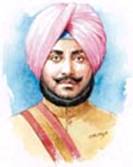“The ultimate solution probably lies in the introduction of scanners as a primary means of security screening at our airports. …Part of my discussion with the EU is seeking to persuade it that we can resolve the particular problems of religious headwear by addressing the wider issue of adopting scanners as a primary screening method,”: the UK Secretary of State for Transport, Mr. Phillip Hammond told the UK parliament, when the issue was raised about the impact of new EU regulations.
London, UK, Sep. 06, 2010
Ravjeet Singh
UNITED SIKHS and the Central Gurdwara London has called upon the Indian Prime Minister, Dr Manmohan Singh, to raise with his Polish counterpart the problems faced by Sikhs, who are asked to remove their turbans at Polish airports, particularly since an EU regulation came into force in April.

“We are aware that you will be meeting a Polish trade delegation on the 7th September 2010, which will include the Polish Prime Minister, Mr. Donald Tusk. We hope that you will be able to raise this critical concern with the Polish Government during the course of talks, given that the freedom of religion is a fundamental right enshrined in Article 18 of the International Covenant on Civil and Political Rights (ICCPR), which Poland has ratified.” said UNITED SIKHS, a UN affiliated international advocacy organization and the Central Gurdwara, the oldest Gurdwara in the western hemisphere, in a letter faxed to Dr Manmohan Singh.
In October 2009, a UK national, Narinder Singh, contacted UNITED SIKHS after he was stopped by members of the security team at the Frederick Chopin Airport of Warsaw, Poland, who forced him to remove his turban in full view of the public. He faced this humiliation even though he had passed through necessary security checks without setting off metallic scanners or raising an alarm when his belongings were screened by X-Ray machines.
Then, in December 2009, we received a similar complaint from another UK national, Shaminder Singh, who was made to remove his Turban despite having an ad hoc agreement in place with the Polish Border Guard. He offered to have his Turban patted down, which in itself is extremely insulting, or have it scanned using a handheld scanner but both his suggestions were rebuffed.
These are not isolated incidents and are of great concern since EC Regulation 300/208 came into force on 29 April 2010, whereby the European Union altered the rules on the searching of religious headwear at airports.
“This overzealous implementation of the new rules by Poland has had a severe impact on Sikhs and will potentially affect all Sikhs who are Indian nationals, who travel to Poland. Indeed, reports are filtering through from Poland and the rest of the world indicating that Sikhs at Polish airports are now routinely being asked to remove their Turbans and are subjected to humiliating checks in full public view”, the letter to Dr Manmohan Singh added.
“Even though, these regulations apply to all European airports, the UK government, has suspended the implementation of these regulations after receiving representations from the UK Sikh community,” said Mejindarpal Kaur, UNITED SIKHS director.
“The new regulations were discussed in the United Kingdom Parliament in July when Gareth Johnson, MP (Dartford), asked what guidance was in place for search of religious headwear at (UK) airports,” she added.
In response to the MP’s question, the UK Secretary of State for Transport, Mr. Phillip Hammond told parliament, “There is a large and well-integrated Sikh community in the UK. Special arrangements to take account of their headwear have existed at least since the introduction of compulsory motorcycle helmets… On 25 June, I instructed UK airports that they should temporarily revert to the previous arrangements, despite the EU rules. The Sikh community has recognised this positive step and we are now working with them and with the EU to identify a suitable way forward.”
“The ultimate solution probably lies in the introduction of scanners as a primary means of security screening at our airports. At the moment, that cannot be done under EU rules. Part of my discussion with the EU is seeking to persuade it that we can resolve the particular problems of religious headwear by addressing the wider issue of adopting scanners as a primary screening method,” he added.